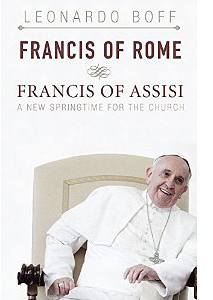Book Notes
 Leonardo Boff, Francis of Rome and Francis of Assisi; A New Springtime for the Church (Maryknoll: Orbis, 2014), 160pp.
Leonardo Boff, Francis of Rome and Francis of Assisi; A New Springtime for the Church (Maryknoll: Orbis, 2014), 160pp.
Let us pray that the Brazilian liberation theologian Leonardo Boff (b. 1938) is right. When Jorge Mario Bergoglio (b. 1936) was elected Pope on March 13, 2013, he became the first Jesuit Pope, the first Pope from the Americas, the first Pope from the Southern Hemisphere, and the first non-European Pope in almost 1300 years (although his parents were Italians who emigrated to Argentina). He was also the first Pope to take the name Francis. By taking the name of the saint of Assisi, says Boff, the pope "wants to send a message to all."
That papal message is one of radical reform. Today only 24% of Catholics live in Europe, and even this small remnant "is in its twilight years, its death throes. Once it was a spring of living water. Today it is a pond of lifeless, stagnant water." It's a "decadent and dying" church of "disgrace" that's beset by financial and sexual scandals. It's morally bankrupt and has lost all credibility. As an institution, it's a medieval monarchy — exclusionary, elitist, and hierarchical. In short, says Boff, the western Catholic church is "in a state of ruin."
And yet. In these dark days, "divine providence has sent us Pope Francis." No matter how egregious its faults and failures, "the church institution keeps the sacred memory of Jesus and the grammar of the gospel." In his first interview just three days after being elected Pope, Francis said that he longs for "a church that was poor and for the poor." And so the connection with his 13th-century namesake, who famously heard the voice of God: "Go and restore my house, because it is in ruins." During the reign of the most powerful pope in history (Innocent III), Francis said that he wanted to be a "novellus pazzus" or "new madman," living a crazy life of poverty, simplicity, and humility.
Boff the cheerleader is enthusiastically optimistic about Pope Francis. He anticipates radical reform of the curia. Structures are important but secondary, he says. What's important is a new spirit of unconditional love, unbounded compassion, shared restraint, and voluntary simplicity. The church should be more like an open house and less like a closed fortress. "The church's long winter is over," he writes, "spring is arriving, full of promise." If Boff turns out to be correct about Pope Francis, this will be the most important of the eighty books he has written.


